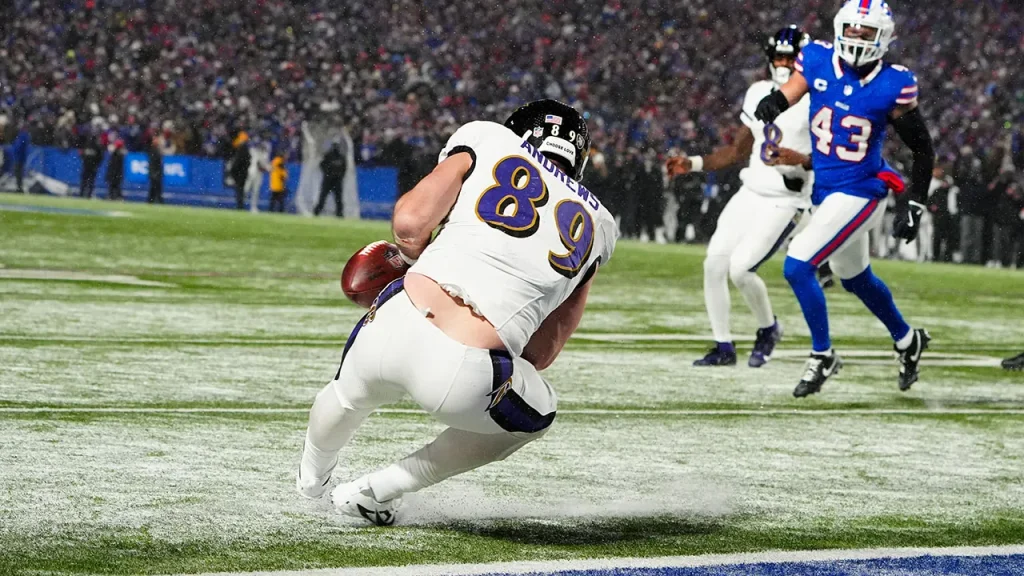The Baltimore Ravens’ agonizing 27-25 divisional round playoff loss to the Buffalo Bills served as a stark reminder of how pivotal every single play can be in the high-stakes environment of postseason football. Tight end Mark Andrews, a three-time Pro Bowler and cornerstone of the Ravens’ offense, found himself under intense scrutiny after two costly mistakes in the fourth quarter: a fumble that led to a Bills field goal and a dropped pass on a crucial two-point conversion attempt that could have tied the game. While Andrews’ overall performance, with five catches for 61 yards, was not statistically insignificant, the timing and impact of these two errors overshadowed his contributions and fueled post-game analysis.
The fumble, occurring deep in Ravens territory, halted a promising drive and handed the Bills excellent field position, resulting in three points that ultimately proved decisive in the narrow loss. The dropped two-point conversion, with the Ravens trailing by two points in the game’s waning moments, extinguished the team’s hopes of forcing overtime and extending their playoff run. These two plays, occurring in a high-leverage situation, became the focal point of discussion surrounding the Ravens’ defeat. The weight of these crucial moments, combined with the magnitude of the playoffs, amplified the impact of Andrews’ mistakes, underscoring the fine margins that separate victory and defeat in postseason football.
Despite the intense criticism directed at Andrews following the game, both Ravens head coach John Harbaugh and several teammates rallied around their star tight end, emphasizing his significant contributions throughout the season. Harbaugh poignantly stated, “We wouldn’t be here without Mark Andrews,” acknowledging Andrews’ instrumental role in the team’s success leading up to the playoffs. Andrews finished the 2024 season with 55 receptions for 673 yards and a career-high 11 touchdowns, solidifying his status as a key offensive weapon for the Ravens. This support from the coaching staff and fellow players highlighted Andrews’ consistent performance throughout the year and aimed to contextualize the unfortunate errors within the broader narrative of his season.
Safety Kyle Hamilton echoed Harbaugh’s sentiments, adding, “For anybody to say anything about him, you have to look in the mirror,” suggesting that the blame for the loss should not be solely placed on Andrews but shared collectively. Indeed, the Ravens’ overall performance was marred by three turnovers, indicating broader issues beyond just Andrews’ individual mistakes. This perspective underscored the complexity of the game and cautioned against assigning disproportionate blame to a single player, especially given the high-pressure environment of playoff football.
The loss to the Bills represents another frustrating chapter in the Ravens’ recent playoff history. The team has consistently qualified for the postseason, reaching the playoffs in six of the last seven seasons. However, they haven’t advanced to the Super Bowl since their victory in the 2012 season, a drought that underscores the difficulty of navigating the challenging playoff landscape. This recurring inability to reach the ultimate stage of the NFL season highlights the fine line between success and failure in the playoffs and the importance of consistent execution in high-pressure situations.
The Ravens’ playoff exit serves as a sobering reminder of the unforgiving nature of postseason football, where even the smallest mistakes can have significant consequences. While Mark Andrews’ errors undoubtedly played a role in the loss, the narrative extends beyond his individual performance. The team’s overall struggles with turnovers, coupled with the inherent pressure of playoff competition, contributed to the disappointing outcome. The Ravens will now look to regroup and address these issues as they prepare for the next season, aiming to finally overcome the playoff hurdle and return to Super Bowl contention. The experience of this close defeat, while painful, provides valuable lessons that can be applied in future playoff runs.

